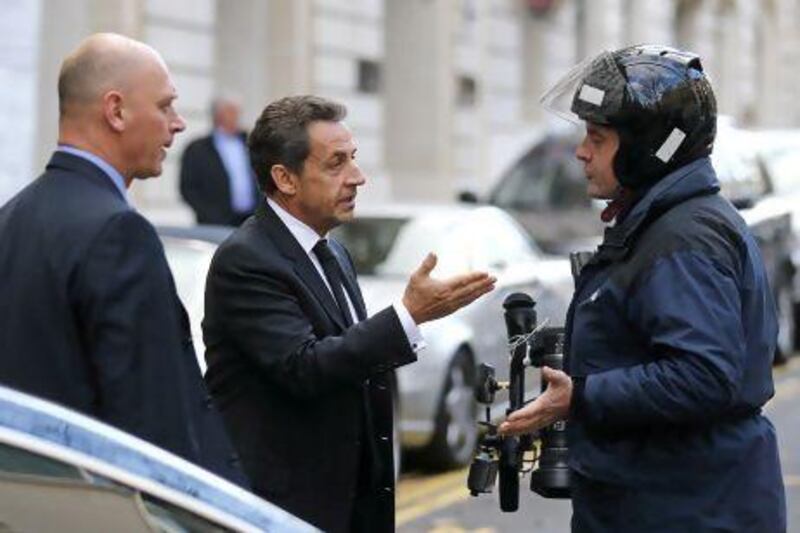The former French president, Nicolas Sarkozy, faces a period of acute discomfort as he seeks to ward off persistent claims of corruption in dealings with Muammar Qaddafi's Libya, Pakistan and France's wealthiest family.
Driven from power by the socialist François Hollande last May, Mr Sarkozy has been the target of repeated allegations about illegal or irregular financial backing for his election campaigns.
He has consistently and robustly denied wrongdoing. But in the French media's latest disclosures, a Franco-Lebanese businessman, Ziad Takieddine, is said to have told an investigating judge that Mr Sarkozy received more than €50 million (Dh240 million) for an earlier election campaign from the Qaddafi regime.
The newspaper Le Parisien reported Mr Takieddine, who is under criminal investigation over a separate matter - the so-called "Karachi affair" - had told the judge, Renaud van Ruymbeke, that most of the money was given between December 2006 and January 2007. In May 2007, Mr Sarkozy romped to victory against Mr Hollande's former partner, Segolene Royal, to win a five-year presidential term.
According to the newspaper, Mr Takieddine told the judge he could produce documents to support his claims but would do so only if there were a separate judicial inquiry.
The Karachi affair, involving kickbacks from the sale of French submarines to Pakistan, is an especially emotive issue in France. A 2002 bombing in the city that killed 14 people included 11 French technicians from a marine engineering company.
At first the French authorities blamed Al Qaeda. But lawyers acting for the families, and repeated media reports citing intelligence sources, suggested a link with the former president Jacques Chirac's decision to halt the kickbacks.
Mr Chirac reportedly acted after learning that an amount equivalent to about €1.5m, representing 20 per cent of the commission, had been diverted to the 1995 presidential election campaign of his rival, Edouard Balladur. Mr Sarkozy was the finance minister at the time and was the spokesman for Mr Balladur's unsuccessful campaign.
Mr Takieddine is one of two Lebanese businessmen who benefited as intermediaries in the submarine sales. He has always claimed to have acted in accordance with official French instructions and, like Mr Sarkzoy, and Mr Balladur, denies any involvement in secret electoral campaign funds.
In the case of Libya, he says cash was handed over during a number of meetings between an official of the Qaddafi regime and Claude Gueant, at the time a senior aide to Mr Sarkozy.
When the French investigative website Mediapart made similar allegations, Mr Sarkozy launched defamation proceedings.
Mr Gueant, who served Mr Sarkozy as interior minister, told French television this week that the allegations were "pure fabrication".
He said no Libyan individual or authority had ever used or sought to use him as an intermediary to channel funds to Mr Sarkozy's 2007 campaign. Contacts were limited, he said, to routine exchanges between a candidate widely expected to win and the foreign governments with whom he would be expected to deal once elected.
But the former president's troubles with the law do not end there.
He has been questioned by police investigating yet more claims about illicit election funding, notably that his 2007 campaign finances were boosted by large cash payments from the family of France's richest woman, Liliane Bettencourt, heiress to the L'Oreal cosmetics empire.
Last summer, officers carried out searches at the offices of a legal firm in which Mr Sarkozy is a partner and also a Paris house rented by his wife, Carla Bruni-Sarkozy.
More recently, France's electoral watchdog rejected his 2012 presidential campaign expenses, accusing the beaten president of breaching limits by using public money to enhance his re-election prospects even before he officially became a candidate.
If an appeal fails, the financial penalties could cripple Mr Sarkozy's Union for a Popular Movement (UMP) at a time when it is deeply split by an internal power struggle.
And another investigation has been launched to examine the alleged misuse of taxpayers' funds to finance private opinion polls, in which voters were even asked what they thought about Mr Sarkozy's relationship with and then marriage to Ms Bruni-Sarkozy.
The impression created by the stream of allegations levelled at Mr Sarkozy is that he is up against a campaign of relentless persecution by his many enemies - or has a lot of tough questions to answer.
The pursuit of political leaders once they leave office and, in the case of presidents, lose immunity from prosecution, is a familiar aspect of French public life.
Mr Chirac was given a suspended sentence in December 2011 after being convicted of corruption dating from his spell as mayor of Paris. He was accused of inventing fictitious city-hall jobs for friends and political allies.
His former prime minister, Alain Juppe, had earlier received a suspended jail term for his involvement, though he has successfully returned to public life and won respect as Mr Sarkozy's foreign minister.
Mr Chirac's socialist predecessor, Francois Mitterrand, died before allegations surfaced about unlawful phone-tapping of opponents, journalists and even celebrities. Several former aides were later convicted for their part in the activities, motivated by political concerns but also Mr Mitterrand's obsession with avoiding disclosure of his parallel life with a mistress and illegitimate daughter.







